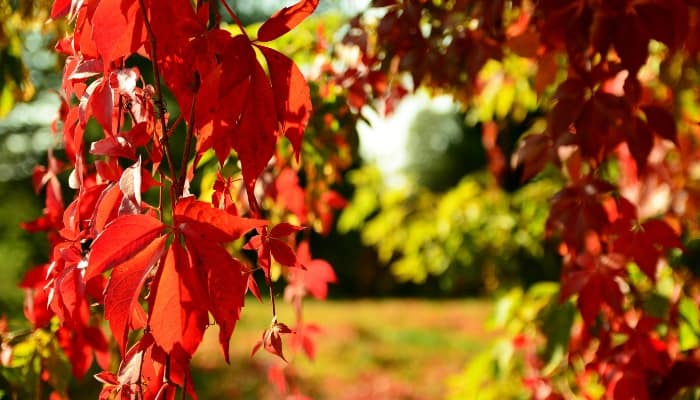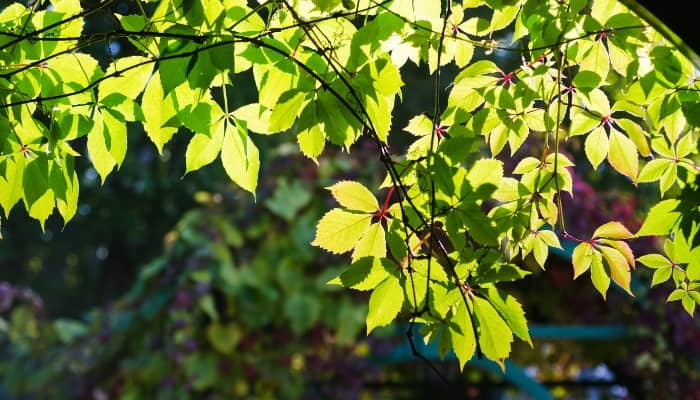Virginia creeper, also known as Parthenocissus quinquefolia, can be quite a handful to get rid of if you don’t know the right approach. While it may not be a problem when it’s young, once it takes root, it can be a challenge to control.
Luckily there are 6 great ways to stop it in its tracks or help to keep it under control!
Will Roundup® kill Virginia creeper? Roundup® will kill Virginia creeper if sprayed according to the packaging instructions. Its active ingredient, glyphosate, is a powerful herbicide. Spraying both the leaves and crown can help remove it quickly, but multiple applications may be necessary to fully stop it from growing.
Killing Virginia creeper is a must when it begins to get out of hand or affects the growth of other nearby plants.
Roundup® is one way to kill the vine, but there are other more natural alternatives that can also kill it. Read on to learn 6 proven methods to remove Virginia creeper so it doesn’t overtake your garden!
How To Kill Virginia Creeper
Both physical and chemical methods exist to remove the vine; however, different methods may be more effective if used in conjunction with one another to remove it fully.
1. Use Strong Herbicide
Using a strong herbicide like Roundup® is one way to ensure the vine will die and most likely never grow back. Sometimes multiple applications will be necessary if it has become well established.
Unfortunately, applying herbicide in a focused area or only on the intended plant can be difficult, so be sure to cover other nearby plants so it only affects the intended vine.
Read the label, and follow the directions exactly.
2. Manually Remove as Much as Possible
Physical removal is an effective way to remove the vine. Sometimes this can be difficult because of its invasive habit, growing far beyond reach.
Always use gloves when removing this vine because its sap and tiny hairs may cause skin irritation. Try to remove as much as possible, or sever any shoots you can not reach, like in trees or on tall structures, so growth will be stopped.
3. Solarization
A natural alternative to using herbicides is solarization, which utilizes the sun’s heat to suffocate the plant. Follow the steps below to use this method on Virginia creeper and other species to keep them from growing back.
- Physically remove as much of the vine as possible, wounding the vine so it is weakened for the next step.
- Cover the vine at ground level with a black plastic sheet, and ensure it is staked down so the vine will receive as little sun and oxygen as possible.
- Leave the plastic cover on for 6-8 weeks, and then remove the cover, and destroy any new growth. If there are still signs of growth, re-cover the vine for a few more weeks.
- Allow the plastic to stay covering the vine for as long as possible. It will eventually deplete the vine of its energy, and the vine will be killed permanently.
4. Vinegar
While you may use vinegar for cooking or cleaning, its high acid content can also be used as a natural herbicide!
Mix white vinegar with water in a 50:50 ratio. Apply to the leaves and root base of the plant to kill it.
This method may require multiple applications to fully kill the plant, and be sure not to spray non-target plants as the vinegar will damage them too.
5. Bleach
Bleach may be something you’ve never thought of using as an herbicide, but its strong basic properties will kill a vine.
Use any type of regular bleach mixed with a few drops of dish soap.
A full 12-ounce spray bottle of bleach with a small amount of dish soap sprayed on the leaves and soil of the plant will kill it quickly! (And any plant around it!)
6. Remove All Signs of New Growth
All plants use copious amounts of energy to grow new shoots. Removing new shoots regularly will prevent the vine from taking hold and smothering other plants.
Continually restricting the plant’s growth will force it to use all of its energy to grow more shoots while not producing any new energy or strong vines, eventually killing the vine.

How Do Herbicides Work?
Herbicides work in a few different ways, mostly focusing on disrupting a plant’s regular growth cycle so it can’t grow like it normally would.
Targeting enzymes the plants use to create amino acids and photosynthesize, these chemicals cause the plant to die by blocking vital functions.
Glyphosate Alternative
Even though glyphosate is an effective and proven weed killer that is approved by the FDA, its safety has been questioned, and many people prefer alternatives.
The above-mentioned vinegar-and-water mixture is an effective natural weed killer, and physical removal is the best way to guarantee a weed’s destruction.
Using a controlled flame or heat torch is also an effective alternative to herbicides.
North Carolina University has done a great job describing concerns regarding the use of glyphosate as well as a few glyphosate alternatives. Their findings and suggestions can be found on their website here.
Homemade Vine Killer
Other vines and weed killers exist that combine multiple ingredients you most likely have in your kitchen!
Try the recipe below for another way to kill vines without the use of chemical herbicides. Just be sure to avoid getting the solution on plants you’d like to keep!
- Mix 1/2 gallon of white vinegar into a bucket along with 1/2 cup of table salt and 1 teaspoon of dishwashing soap.
- Be sure to thoroughly mix the ingredients together. Once the salt has been dissolved, it can be applied by use of a spray bottle.
- Spray it directly at the crown of the plant you are aiming to kill.
- Repeat applications until the plant has died.
Related Questions:
Is Vinegar as Good as Roundup®?
Vinegar has been used by gardeners and homeowners for years as an alternative to Roundup®.
While Roundup® is good to use in cases where nothing else will work, it does contain glyphosate, a highly controversial substance.
Try vinegar first, and if it doesn’t work, the plant may be too tolerant, and Roundup® will be necessary.
Will Goats Eat Virginia Creeper?
Goats can eat Virginia creeper and not have any side effects! They will mow down the vine because they enjoy the taste and because their guts have special enzymes that allow them to eat poisonous plants without issue.
Wrapping It Up
Managing Virginia creeper can be difficult, but with these solutions, it seems more feasible than not!
Use multiple methods in unison to wound the vine quickly to reduce its chances of growing vigorously and out-competing your other plants.

